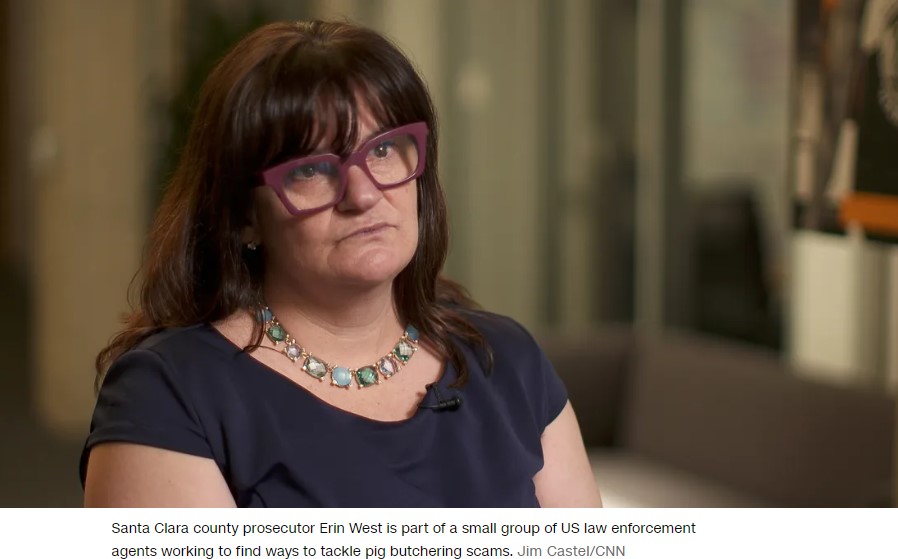Murdered by fraud: His father took his own life after an international crime syndicate stole his savings. And he wasn’t the only one Matt sits at his kitchen table and tries to put into words the events of the past few months. “When I found out it was suicide, I was 100 percent sure it was a fraud,” he says. “Our father was always a positive, happy person from the day I was born until six months ago. It was literally the only thing that ever changed him in his life, and it just destroyed him.” The family gathers at his sister Adrienne’s house on a horse ranch in Northern Virginia, surrounded by vast fields and stables. In the three months since their father committed suicide, the victim of a so-called “pig massacre,” the family has been doing the same thing. “Fraud was common. The scam originates mainly from Southeast Asia and is so named because it aims to “groom” its victims before taking everything from them.

The scammers behind it assume fake online identities and spend months preparing their financially to trick their victims into investing in cryptocurrency scam websites. Dennis Jones, an avid runner and photographer, was adored by his children and grandchildren. Described by his family as a “bit of an activist,” the 82-year-old spent much of his retirement working with refugees and discussing politics online. But in the last months of his life, he estranged himself from his family and, after years of divorce, befriended a woman named Jessie on Facebook. The two spent months talking online and building a close relationship. Eventually, Jesse convinced Denise to invest in cryptocurrency.
Denise agreed. Without ever meeting Jesse in person, he spent everything he had, and when he had nothing left, she asked for more. Until one day, the money ran out and he was broke. In early March, Dennis’ children organized a meeting to help their father recover from the fraud scandal. The plan was for him to live with Adrian and her family. “We wanted him to know he would be taken care of,” Matt said. But the morning of the meeting, no one could reach Dennis. Matt drove to Dennis’ apartment, but he wasn’t home, and all calls went straight to voicemail. They thought he’d missed a long run. An hour later, police knocked on Matt’s door to tell him Dennis had committed suicide.
Dennis was one of countless victims of a massive global criminal operation run primarily by Chinese gangsters who have built a multibillion-dollar fraud industry in Southeast Asia, where they have amassed an army of con artists, many of whom are held against their will in guarded facilities and forced to scam entire life savings from people all over the world. A theft so massive that investigators are now talking about a massive transfer of wealth from the American middle class to criminal gangs. According to FBI estimates, tens of thousands of American victims were defrauded out of nearly $4 billion in pig slaughter scams last year, a 53% increase from the previous year.
Though the crime is committed online, its real-world impact is devastating. Law enforcement officials predict losses will continue to rise next year, and money and lives will continue to be lost as criminals remain untouched. Santa Clara County District Attorney Erin West has dedicated the past few years to fighting pig slaughter fraud. “I’ve been a prosecutor for over 25 years and I’ve committed every type of crime,” she said. “I’ve been a victim of sexual assault for nine years, and I’ve never seen such a large scale of destruction of people as the pig slaughter,” she says. Erin and her team, who lived in the tech hub of California’s Bay Area, were among the first to start investigating the pig slaughter scam. “We have victims being victimized, and the only winners are the Chinese gangsters,” she says. US Special Agent in Charge of the San Francisco Field Office, Shawn Bradstreet, told CNN that some of the funds stolen from American victims are being used to expand the fraud operations, the large facilities that house victims, and other illegal activities.

West and Bradstreet are part of a small group of U.S. law enforcement agencies looking for ways to fight crimes that occur primarily online and abroad. Social media is rife with scammers targeting victims on WhatsApp, Facebook, LinkedIn and even dating apps like Bumble and Tinder. “The sad reality is that on dating apps and any online platform, scammers prey on the emotions of people looking for love and committed relationships,” a spokesperson for Match Group, which owns Tinder, said in a statement. Both Match, Facebook and Meta, parent company of WhatsApp, told CNN they are working to stop scammers from using their platforms by flagging suspicious language and educating users. CNN has reached out to LinkedIn and Bumble for comment. In May, a group of technology companies, including crypto exchanges Coinbase, Meta, Match Group, and anti-fraud charity GASO, acknowledged that fraud is a “pervasive problem across the tech industry” and announced the “Tech Against Scams Coalition.”
But West says that’s not enough. Recently, he created a task force called “Operation Shamrock” to bring together law enforcement, social media, crypto exchanges, and traditional banks to fight crypto fraud. A 2023 CNN investigation found that many of the scammers are themselves victims of human trafficking. They are lured to Southeast Asia with promises of clerical work, only to be trafficked instead to countries like Myanmar, Cambodia, and Laos. Since the 2021 military coup, Myanmar has become Asia’s fraud capital, with criminals free to operate under the guise of a bloody civil war. Today, a city-sized settlement has risen on the Myanmar side of the border with Thailand, with only a dried-up river separating the two countries. Inside is what can only be described as a scam factory, offices full of hundreds of slaves working 16-hour days to befriend victims and convince them to invest in cryptocurrencies on fake platforms that mimic legitimate cryptocurrency exchanges.

Inmates tell stories of torture and abuse, of scammers not bringing enough money, of being beaten with electric batons and forced to do hundreds of squats as punishment. Rakesh, an Indian national, was trafficked to a settlement called Gate 25 in Myanmar after applying for an IT job in Thailand in late 2022. There, he was forced to sign fraud contracts under threat of execution and trained in the fraudulent business. For 11 months, he posed as “Clara Semonov,” a Russian investor from Salt Lake City. To avoid brutal punishment from his captors, he sent romantic messages to victims like Dennis, convincing them to invest money. “You fall into false love 70 to 80 percent of the time,” he says. Rakesh was eventually released in 2023 when his contract ended. He believes he was fired because he hadn’t cheated enough.
“They treated us like slaves,” he told CNN a few days after his release in 2023. These complexes are conveniently located along the border and use telecommunications services from the Thai side. In November 2023, Thai Minister of Law Tawee Sodsong said he was working to shut down the complexes. Subsequently, Phatchara Nariptaphan of the National Broadcasting Commission of Thailand told CNN that in May, he ordered all telecommunications operators to suspend mobile phone service near areas bordering Myanmar, Laos and Cambodia. Nonetheless, their data shows that illegal activity continues at a baseline level as criminals adapt to using other means of internet connectivity, such as Starlink. Even here on the border, the physical distance is as narrow as a narrow river, and criminals are beyond the reach of local and international law enforcement.

“Many of these perpetrators are beyond my reach, and to achieve deterrence, we must prosecute some of the people who run these operations in Southeast Asia,” Santa Clara District Attorney Jeff Rosen said. Of the roughly $5 billion lost in cryptocurrency fraud in 2023, $3.96 billion was stolen in pig slaughter fraud, according to FBI data. While Rosen’s office and the Secret Service have had some success in recovering millions of dollars in stolen funds, U.S. law enforcement has not been able to arrest a single suspected fraudster. “Hard to believe” Karina, who asked CNN to use only her first name, met “Evan” on Bumble in May 2023. His photos showed a blonde man with piercing blue eyes. He claimed to be Dutch and flaunted his wealth, including expensive cars and Rolex watches, but none of that appealed to Karina, a chemistry doctoral student and triathlete. Their relationship developed quickly. He soon suggested they move their conversations to WhatsApp and delete the Bumble app to focus on getting to know each other. A few days later, he started calling her “darling.” In a text message conversation obtained by CNN, Karina asked, “Are you doing this yet?”
“A big psychological trick” After Dennis’ suicide, his adult children had to go through his Facebook messages to reconstruct what had happened. There, they learned for the first time what Dennis had been struggling with. “I have dark thoughts about my life and wonder if it’s over,” Dennis wrote to the conman a few months before his death. “My financial life certainly seems over,” he wrote to the conman. “And the biggest pain is knowing that I’ve betrayed the trust of my family.” “I can’t stand this,” he wrote in a screenshot of the conversation reviewed by CNN. “This is the most heartbreaking thing I’ve read.
He told me he was having a nervous breakdown. So all of these messages were shared on his profile,” Adrienne said. “Instead of sharing it with us,” Matt added. “What’s surprising is that overseas scammers have found a way to get their victims to trust them more than their own families,” West said. “This is a big psychological trick they’re doing to the rest of the world.” Karina didn’t tell her family about what happened and the stress she was under until the last moment. After reaching her event goal, she tried to withdraw some of her funds, but she couldn’t because she violated the platform’s rules by investing in the same account as Evan.
After months of hiding, Karina confided in her family, who suggested she talk to Kraken directly. The next morning, she called Kraken customer service, only to be told that no account in her name existed. “I realised I’d been scammed and then I collapsed,” Karina says. “It was all fake. It was a fake profile. It was all made up.” He cared about me and spent a certain amount of time getting to know me. ” A year later, when Karina read their conversations again, she hardly recognized herself. “It’s heartbreaking to see the situation I was in,” she says. The emotional and financial entanglements took a toll on her, and she was devastated by the breakup and bankruptcy at the same time.
As a result, Karina had to move back in with her mother. It would take her at least 10 years to pay off her debts. “Playing with emotions”Adrianne and Matt are still grieving and only beginning to understand what happened to their father. “He wasn’t dealing with one person, he was dealing with a multi-billion dollar crime organization whose strategy was based on emotions… It was like he was brainwashed,” Dennis’ daughter Adrianne said. As criminals’ methods evolve and law enforcement struggles to find ways to stop them, 2024 will see more victims and even more people who, like Matt and Adrianne, will lose more than just money. “He died ashamed, embarrassed, financially devastated and heartbroken. And if sharing our story helps someone else, another family, then it’s all worth it,” says Adrienne. If you believe you’ve been a victim of cyber fraud, the FBI encourages you to report it to the Internet Crime Complaint Center (IC3) at https://www.ic3.gov/Home/ComplaintChoice.

